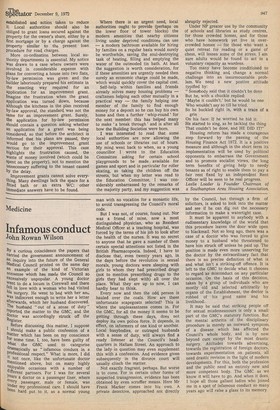Medicine
Infamous conduct
John Rowan Wilson
8Y a curious coincidence the papers that carried the government announcement of an inquiry into the future of the General Medical Council printed on the same day an example of the kind of Victorian nonsense which has made the Council so excessively unpopular. A young doctor Went to do a locum in Cornwall and there fell in love with a woman who had visited his surgery. He went to bed ,with her anu was indiscreet enough to write her a letter afterwards, which her husband discovered. The husband "out of a sense of duty" reported, the matter to the GMC, and the doctor was accordingly struck off the Register.
before discussing this matter, I suppose I should make a public confession of a Matter which has been on my conscience for some time. I, too, have been guilty of What the GMC used to categorise dramatically as "infamous conduct in a professional respect." What is more, I did 1r not once, like the unfortunate doctor Mentioned above, but on many highly en. Joyable occasions with a number of different partners. For I was for several Years a doctor on a passenger liner, where every passenger, male or female, was i_under my professional care. I should have ueen hard put to it, as a normal young
man with no vocation for a monastic life, to avoid transgressing the Council's moral code.
But I was not, of course, found out. Nor was a friend of mine, now a most distinguished physician, who as Resident Medical Officer at a teaching hospital, was forced by the terms of his job to look after the health of the nurses. It was no secret to anyone that he gave a number of them certain special attentions not listed in the British Pharmacopoeia. Indeed, I have to disclose that, even twenty years ago, in the days before the revolution in sexual morals, young doctors were sleeping with girls to whom they had prescribed drugs (not to mention prescribing drugs to the girls they had slept with) all over the place. What they are up to now, I can hardly bear to think.
Every now and then the odd, person is hauled over the coals. How are these unfortunate scapegoats selected? This is where the unpleasantness comes in. For the GMC, for all the money it seems to be getting through these days, does not deploy its own police force. It depends, in effect, on informers of one kind or another. Local busybodies, or outraged husbands with a sense of duty, will always find a ready listener at the Council's headquarters in Hallam Street. An approach to the lady in question may even supplement this with a confession. And evidence given subsequently in the divorce court will usually clinch the matter.
Not exactly fragrant, perhaps. But worse is to come. For in certain other forms of suspected transgression, evidence has been obtained by even scruffier means. Here Mr Frank Marker comes into his own. A private detective, approached not directly by the Council, but through a firm of solicitors, is asked to look into the matter and see if he can dig out the necessary information to make a watertight case.
It must be apparent to anybody with a rudimentary knowledge of the world that this procedure leaves the door wide open to blackmail. Not so long ago, there was a case of a doctor who was forced to give money to a husband who threatened to have him struck off unless he paid up. The position is made even more unnerving for the doctor by the extraordinary fact that there is no precise definition of what is and what isn't a striking-off offence. It is left to the GMC to decide what it chooses to regard as misconduct on any particular occasion. On the basis of this decision, taken by a group of individuals who are mostly old and selected arbitrarily by organs of the Establishment, the doctor is robbed of his good name and his livelihood.
It may be said that striking people off for sexual misdemeanours is only a small part of the GMC's statutory function. But the mental arthritis of the disciplinary procedure is merely an outward symptom of a disease which has affected the Council's whole body, and is by now beyond cure except by the most drastic surgery. Attitudes towards advertising, towards the registration of foreign doctors, towards experimentation on patients, all need drastic revision in the light of modern developments. For this, both the profession and the public need an entirely new and more competent body. The GMC as we know it will have to go. And when it does, I hope all those gallant ladies who joined me in a spot of infamous conduct so many years ago will raise a glass to its memory.










































 Previous page
Previous page